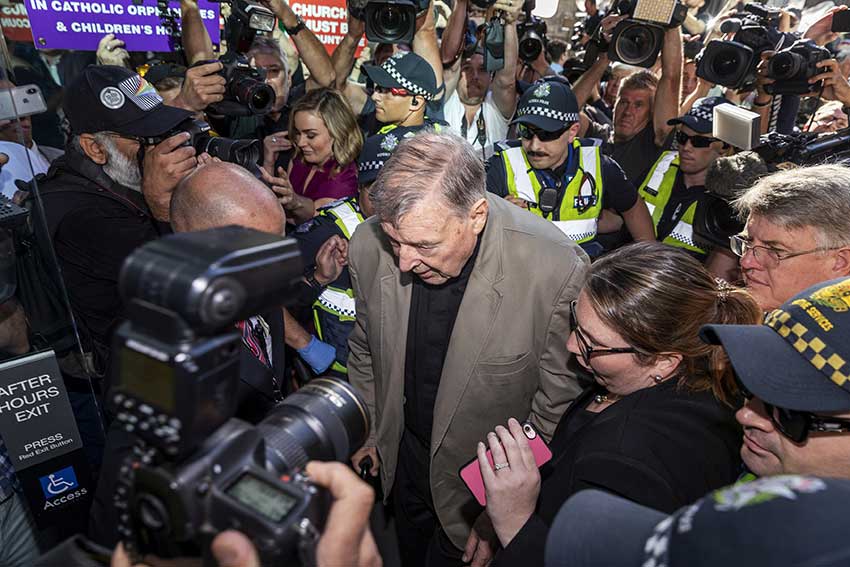
Those highlighting the cost of Cardinal Pell’s defence are not giving the public the context or the whole truth about what he was up against.
Cardinal George Pell’s legal defence cost $3 million; so ran the article in The Australian last weekend.
The legal fees which – according to the report – have still not been paid in full, were borne by the Cardinal himself as well as friends, family and others who were willing to chip in to help his cause.
While a legal bill of several million dollars might seem extravagant to non-lawyers, those among us who are or were once lawyers were a lot less scandalised, given our knowledge of the often-exorbitant expenses of legal representation – especially top legal representation.
At the tail end of the story, abuse specialist lawyer Peter Kelso is quoted as saying that celebrities and the wealthy had a better opportunity to fight allegations.
“The underlying message was that Cardinal Pell had bought his way out of the conviction, outmatching the alleged victims in this case and others like it.”
According to The Australian, Kelso said: “When you have the money you can afford a full-on defence,” he said. “That is, you can afford not only the lawyers but their team behind them … whereas the ordinary punter accused of anything can’t afford that.”
Kelso’s sentiments were similar to some of the public commentary following the Cardinal’s vindication last year. The underlying message was that Cardinal Pell had bought his way out of the conviction, outmatching the alleged victims in this case and others like it.
That people with more significant resources of their own or available to them can afford better legal representation is true enough, but I want to seriously question whether the Cardinal’s legal defence spend outmatched what was spent on his prosecution.
Consider the timeline.
A Victoria Police operation known as Operation Tethering began in March 2013. Its aim was to investigate potential abuse allegations against the Cardinal, even though no complaint had been made against him.

Cardinal George Pell arrives at the County Court in Melbourne on 27 February, 2019. He was jailed after being found guilty of child sexual abuse. It would be 405 days before he was found to be innocent by the unanimous decision
Detective Superintendent Paul Sheridan conceded that it could be termed a ‘get Pell’ operation, even if he wouldn’t have described it that way.
Operation Tethering ran for more than a year before anyone came forward. That was a year of Victoria Police time and taxpayer funds spent on seeking out a complainant for a crime and alleged criminal that the police had in their sights.
The operation continued, its flash point intended to be the Cardinal’s return to Australia from Rome in December 2015 where he was to testify before the Royal Commission into Institutional Responses to Child Sexual Abuse. The plan was to arrest and question the Cardinal and then release him, because they did not have permission at that point to charge him with any crimes. It didn’t eventuate because the Cardinal testified via video link, but the plan was in place.
Victoria Police time and taxpayer funds, this time spent on crafting a pantomime of sorts.
Then there were the advertisements published in a variety of media outlets seeking complainants from St Patrick’s Cathedral in Melbourne during the Cardinal’s time as Archbishop, or surrounding the swimming pool in Ballarat East during his time as a young priest.
“We saw Victoria Police sent to Rome to interview the Cardinal, and a back-and-forth match of evidence briefs between the Police and the Office of Public Prosecutions to try and determine whether there was enough evidence to lay charges.”
Perhaps the advertisements were given as freebies to Victoria Police, perhaps they spent more taxpayer funds on trying to find someone – anyone – to make a complaint.
The taxpayer monies spent on the ‘get Pell’ campaign were only getting started.
We have the allegations, now unanimously rejected by the highest court in the land, that were aired on the ABC’s 7.30 Report. The ABC is also funded by the taxpayer.
We saw Victoria Police sent to Rome to interview the Cardinal, and a back-and-forth match of evidence briefs between the Police and the Office of Public Prosecutions to try and determine whether there was enough evidence to lay charges; the Police making the ultimate decision to push ahead.
This was followed by the committal hearing, during which the spurious claims against the Cardinal should have been dismissed instead of being sent to trial, with court and judge time also funded by the taxpayer.

Then there was the first trial, with the cost of the prosecution’s preparation and then the trial itself, the courts and the jury allowances all borne by the taxpayer. Given that this resulted in a mistrial, the State of Victoria also paid $390,000 towards Cardinal Pell’s legal fees, which was approximately half of what he had spent up to that point.
The second trial was just a doubling of these costs, again with the taxpayer footing the bill. The Cardinal was found guilty on all charges and proceeded to a sentencing hearing broadcast, without precedent, on the national broadcaster. The court time and cost as well as the ABC streaming of the sentencing were both added to the taxpayer bill.
There was the cost of the first appeal, heard before three judges of the Victorian Court of Appeal who, if they were doing their job correctly, would have ended the proceedings at that point and quashed the Cardinal’s conviction.
Chief Justice Anne Ferguson and Justice Chris Maxwell, however, declined to follow the lead of their fellow judge and criminal law expert, Mark Weinberg, and upheld the Cardinal’s convictions.
“Yes, Mr Kelso, the Cardinal’s high profile and “celebrity” status may have meant that he had access to greater resources to fund his defence than the average punter, but it was the same high profile and celebrity status that made him a target of Victoria Police.”
This was followed by the High Court appeal, where the sorry – and expensive – saga was finally put to rest, but not without the Cardinal spending 404 days in solitary confinement (again on the taxpayer’s dime).
If the Cardinal’s legal defence cost $3million, it is reasonable to assume that his prosecution cost the same. Add the police time and expenses, the court and jury time and expenses, the cost of imprisonment, the ABC investment into the matter and more, and it would be likely, on a conservative estimate, that the Victorian “justice” system outweighed the Cardinal’s spending on his case by a factor of two.
So, who was outmatched?
Yes, Mr Kelso, the Cardinal’s high profile and “celebrity” status may have meant that he had access to greater resources to fund his defence than the average punter, but it was the same high profile and celebrity status that made him a target of Victoria Police. The average punter is not subject to the same type of police and prosecutorial witch hunts, nor is the average victim afforded that level of laser-focused police attention.
The real scandal is not the amount he spent on his defence, but that Victorians were forced to spend so much on his prosecution, particularly when this diverted police time and taxpayer funds away from the pursuit of justice for others.
Related Articles:
